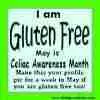-
Welcome to Celiac.com!
You have found your celiac tribe! Join us and ask questions in our forum, share your story, and connect with others.
-
Celiac.com Sponsor (A1):
Celiac.com Sponsor (A1-M):
-
Get Celiac.com Updates:Support Our Content
'gluten-Free' Labeling Rules Head To White House For Usa
-
Get Celiac.com Updates:Support Celiac.com:
-
Celiac.com Sponsor (A17):
Celiac.com Sponsor (A17):
Celiac.com Sponsors (A17-M):
-
Recent Activity
-
- trents replied to GlutenFreeChef's topic in Celiac Disease Pre-Diagnosis, Testing & Symptoms9
Blood Test for Celiac wheat type matters?
Wheatwacked, are you speaking of the use of potassium bromide and and azodicarbonamide as dough modifiers being controlling factor for what? Do you refer to celiac reactions to gluten or thyroid disease, kidney disease, GI cancers? -
- Scott Adams replied to GlutenFreeChef's topic in Celiac Disease Pre-Diagnosis, Testing & Symptoms9
Blood Test for Celiac wheat type matters?
Excess iodine supplements can cause significant health issues, primarily disrupting thyroid function. My daughter has issues with even small amounts of dietary iodine. While iodine is essential for thyroid hormone production, consistently consuming amounts far above the tolerable upper limit (1,100 mcg/day for adults) from high-dose supplements can trigger... -
- Wheatwacked replied to GlutenFreeChef's topic in Celiac Disease Pre-Diagnosis, Testing & Symptoms9
Blood Test for Celiac wheat type matters?
In Europe they have banned several dough modifiers potassium bromide and and azodicarbonamide. Both linked to cancers. Studies have linked potassium bromide to kidney, thyroid, and gastrointestinal cancers. A ban on it in goes into effect in California in 2027. I suspect this, more than a specific strain of wheat to be controlling factor. Sourdough... -
- jenniber replied to tiffanygosci's topic in Introduce Yourself / Share Stuff5
-
- RMJ replied to TheDHhurts's topic in Gluten-Free Foods, Products, Shopping & Medications1
need help understanding testing result for Naked Nutrition Creatine please
They don’t give a sample size (serving size is different from sample size) so it is hard to tell just what the result means. However, the way the result is presented does look like it is below the limit of what their test can measure, so that is good.
-





Recommended Posts
Archived
This topic is now archived and is closed to further replies.